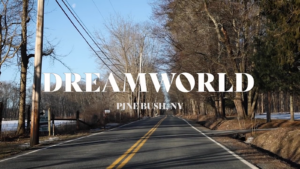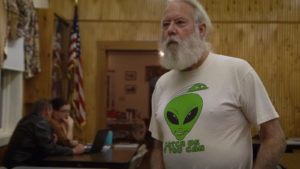Digital Media & Journalism Alumni Produce Documentary Short Film
In the late 80s and early 1990s, hundreds of Tristate area residents gathered on the rural roads of Pine Bush, a sleepy hamlet located about 18 miles southwest of New Paltz, and looked up at the skies. Of the masses that convened expecting an alien encounter, some observed massive triangles, flashing lights and other sightings believed to be proof of extraterrestrial life.
Nearly three decades later, four digital media and journalism seniors completed the capstone short documentary film Dreamworld: Pine Bush, NY, to explore how those whose life-altering extraterrestrial encounters were dismissed as fantasy found a sense of belonging through their participation in a UFO support group.

The documentary, which is now appearing on the film festival circuit, was directed by Pine Bush native Rose Felice and her team members, producer Marlee Capuano, sound engineer Gavin Hughes, and director of photography Mike Munari, with additional camera work and logo creation by Adrian Pollitt, all 2020 New Paltz graduates who continue to work together to promote their film.
Felice recalled thinking aliens painted on the storefronts of her Pine Bush hometown were normal as a child. “It took a little bit of distance to realize that it was a strange town. And that people thought it had a weird energy and that there were these strange stories going around. For me of course, it was normal,” she said. After she realized the town’s distinctiveness, Felice began thinking about how best to document it.

The film centers around longtime Pine Bush resident Bill Wiand, founding member of the United Friends Observer Society (UFOS) support group for those who have experienced an alien encounter or brush with the unexplained. The film’s title Dreamworld is inspired by Wiand’s answer to the question: Do you ever feel frustrated that so many people don’t believe what you’ve been through? The UFOS leader responded to the question by saying, “It’s not about me. If it’s there, it’s there. If it’s not, it’s not. If I’m living in a dreamworld, that’s my dreamworld, that’s my universe.” Felice explained that the title Dreamworld also refers to Pine Bush the place, a seemingly typical small town harboring a surprising secret.
The filmmakers respected the UFOS group members and recognized the prejudice many had faced in going public with their experiences.
“I really enjoyed earning [the support group members’] trust. We approached the subject matter from a very nonjudgmental and earnest way . . . so that they could trust us, feel safe and have their experiences delivered in an honest and not malicious way,” said Munari.

The group had completed most of their filming prior to the beginning of the pandemic but found themselves finalizing the film remotely after campus shut down mid-semester in March of 2020. Given the circumstances, the team feared their film project would grind to a halt. However, after a period of regrouping, Hughes rose to the challenge and completed most of the editing of the film remotely via Zoom while screen-sharing and editing on the fly as Felice and Capuano provided feedback.
“I think our challenges were pretty classic to the challenges of documentary filmmaking at large, where we had all of this footage and all of these ideas but then in our edit we thought okay, what is our story and how do we make a narrative out of all of these different pieces?” explained Felice.
The support group meeting featured in the short documentary was the last to take place before COVID shutdowns began and was so important to their telling of the story of the UFOS group and their experiences. In describing how those interviewed felt about their encounters with UFOs, Felice said that the support group gave survivors a sense of belonging. “It gave them something to believe in which was definitely a theme throughout the documentary – a very specific form of faith and reality,” she said.

The film is a story about an alien encounter support group, but it is more about the general human desire to connect with one another and with a greater purpose.
After their years in the Digital Media & Journalism program, the team felt adequately equipped with the foundational tools necessary to make this film but credited the faculty mentorship provided by Gregory Bray, associate professor of digital media & journalism, whose interest and extensive knowledge of the documentary genre helped inform and guide them through the process. Felice recalls that Bray helped her find a focus for the film, counseling her to utilize more of a cinema verité “follow” style to engage viewers focus on a single person in order to convey a universal idea.
It was a learning process for the group throughout, but one that was certainly worthwhile – they managed to accomplish their goals with no budget, borrowed equipment from campus, and while juggling a full course load, jobs, internships and a pandemic.
The filmmakers are now working at variety of positions at the Woodstock Film Festival, HBO, the New York Racing Association and Stonestreet Studios.
